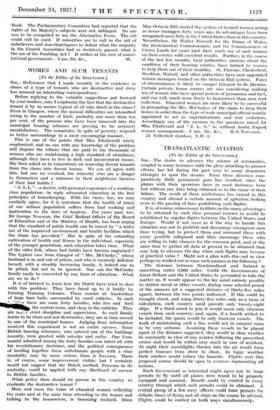WOMEN AND SLUM TENANTS [To the Editor of the SPECTATOR.]
Sin,—References that I made recently to the existence in slums of a type of tenants who are destructive and dirty has .aroused an interesting correspondence.
Before replying to the valuable suggestions put forward by your readers, may I emphasize the fact that the destructive tenant is by no means typical of all who dwell in the slums ? Even in Glasgow, where the normal difficulties are intensified owing to the number of Irish, probably not more than ten per cent. of the persons who have been removed into the municipal housing schemes are proving to be seriously unsatisfactory. The remainder, in spite of poverty, respond to better surroundings in a most encouraging manner.
This is one of the points that Miss FitzGerald wisely emphasized, and no one with any knowledge of the problem will dispute the tribute that she paid to the thousands of women who are maintaining a high standard of cleanliness, although they have to live in dark and inconvenient rooms. She then asked us to concentrate on removing decent tenants from the slums into decent homes. We can all agree with this, but can we overlook the minority who are a danger to themselves and a nuisance to their neighbours because of their bad habits ?
"J. S. L."—a doctor, with personal experience of a working- class population—in reply advocated education in the first principles of housekeeping. With his views, too, we may cordially agree, for it is notorious that the health of many of our artisan population suffers from bad cooking and inattention to the laws of hygiene. For years past, too, Sir George Newman, the Chief Medical Officer of the Board of Education and of the Ministry of Health, has been urging that the standard of public health can be raised by "a wider use of the improved environment and health facilities which the State has provided." But in spite of the extending cultivation of health and fitness in the individual, especially of the younger generation, such education takes time. What of the older folk,* whose bad habits have become engrained ? The typical case from Glasgow of "Mrs. MeClusky," whose husband is in and out of prison, and who is mentally deficient herself, with a steadily increasing family, is indeed one to be pitied, but not to be ignored. Nor can the McClusky family easily be converted by any form of education. What are we to do ?
It is of interest to learn how the Dutch have tried to deal with this problem. They have faced up to it boldly by forming Training Colonies. These consist at Amsterdam of large bare halls, surrounded by small cubicles. In each there are some forty families, who live and feed the central room, and sleep in the cubicles. They are unt.:.e strict discipline and supervision. As each family learns to be clean and not destructive, they are in time moved to one of the municipal houses. Judging from information received this experiment is not an entire success. Some -British housing reformers, who entered one of the buildings recently, were greeted with missiles and oaths. One Com- munist admitted among the forty families can infect all with his revolutionary doctrines, and the political consequences of herding together these unfortunate people with a slum mentality may be more serious than is foreseen. There is, of course, some improvement visible, but I certainly would not suggest that the Dutch method, Prussian in its austerity, could be applied with any likelihood of success to British families.
What policy then should we pursue in this country to eradicate the destructive tenant ?
More and more the value of educated women collecting. the rents and at the same time attending to the houses and talking • to- the houSewives, is -becoming realized. Since Miss Octavia Hill started the system of trained women acting as house managers forty years ago, its advantages have been recognized more fully in the United States than in this country. Nevertheless, Sir Walter Peacock for the Prince of Wales, the Ecclesiastical Commissioners, and the Commissioners of Crown Lands for years past have made use of such women on their estates with excellent results. Further, in the course of the last few months, local authorities, anxious about the condition of their housing estates, have turned to women to help them out of their troubles. St. Pancras, Chesterfield, Stockton, Walsall, and other authorities have now appointed women managers trained on the Octavio. Hill system. Force of circumstances is likely to compel Glasgow to do likewise. Certain private house owners are also considering making use of women who have special powers of persuasion and tact, and can talk much more freely to housewives than men rent collectors. Educated women are more likely to be successful in persuading the Mrs. MeCluskys of the slums to keep their homes in order than the type of male municipal official usually appointed to act as superintendents and rent collectors. Accordingly one of the answers to the questions raised by Miss FitzGerald and "J. L. S." is, without doubt, Expert women management.—I am, Sir, &c., B. S. TOWNROE.
53 Netherhall Gardens, N.W. 3.






























 Previous page
Previous page